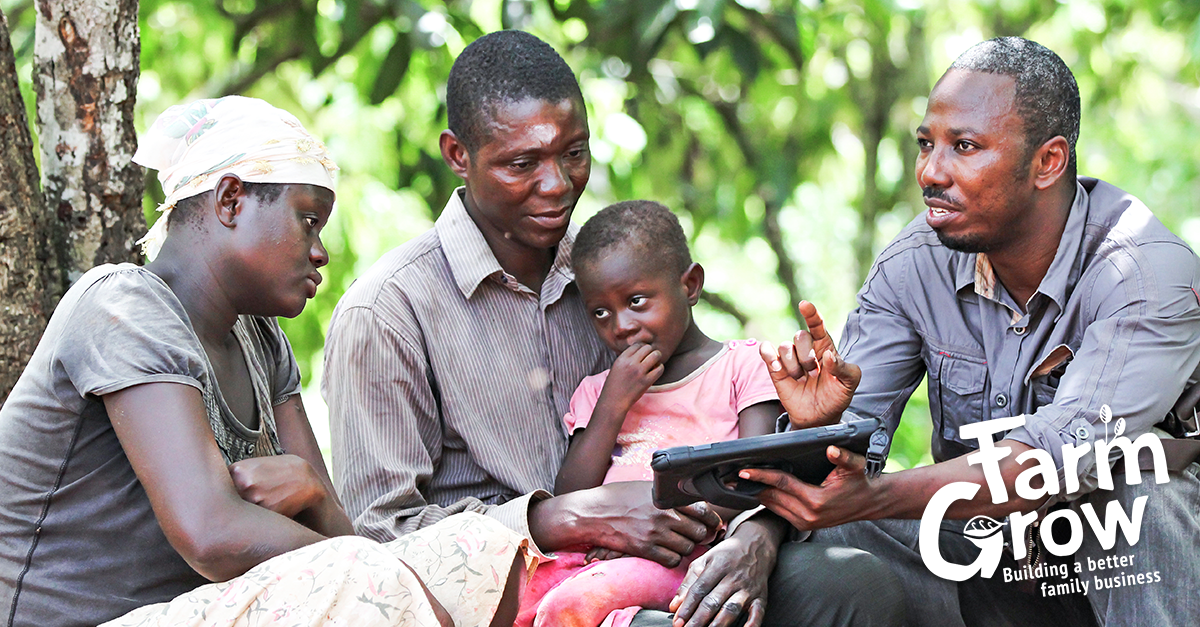Sat4Farming
Information services for sustainable cocoa farm management in Ghana
> Download the Sat4Farming project closure flyer
The main objective of Sat4Farming (Satellites for Farming) was to assist smallholder cocoa farmers in Ghana with Farm Development Plans (FDPs) aiming at 10-40% increase in yields, income and more effective use of inputs. Sat4Farming operates a business-to-business (B2B) model with aggregators (cocoa traders/cooperatives) as customers. Field agents from aggregators are the users of the service and the beneficiaries of the service are smallholder cocoa farmers and their families.
Sat4Farming provides precision agriculture services supported by a technology platform, where first the pre-FDP farm condition is assessed (physical features, land classification, soil condition, plant condition), then an FDP is formulated (application of good agricultural practices (GAPs), soil management, replanting), followed by the monitoring of changes in the condition of the farm (changes in soil condition, changes in tree architecture/health, changes in farm yield, changes in input efficiency).
Sat4Farming was carried out by a consortium, consisting of Rainforest Alliance (an NGO with representation in Ghana and main office in the Netherlands), Grameen Foundation (an NGO with representation in Ghana and main office in the US), Touton S.A. (a commodity trader based in Ghana and main office in France), the University of Ghana and Satelligence and Auxfin (both based in the Netherlands and providers of geodata-based services).
Provided services
The core of the service developed under the Sat4Farming project is called FarmGrow. FarmGrow is a Farm Development Plan (FDP), which is an intense multi-year plan established per farm which benefits the farm household and combines advice with one-on-one coaching of farmers by extension workers that increases the cocoa yield from 450 kg per hectare to 1,500 kg per hectare over time.
Touton S.A. acted as a pilot customer of the service. Touton provided farmer lists from which farmers were selected and profiled that were eligible to receive the FarmGrow service. The selection criteria concerned the capacity and commitment of the farmer to follow the recommendations, the history of the farm and the (possible) certification of the cocoa from the farm. These criteria were also applied to new customers, such as Cargill and Beyond Beans.
The field staff visited the communities of selected farmers to raise awareness with respect to FarmGrow. The FarmGrow process starts with household and farm profiles, an outline of the plan and a profit and loss calculation. Once farmers agree with the plan, the coaching trajectory formally starts. After every coaching session, the adoption observations of the plan are scored again, and recommendations will be given to farmers. All this is filed and monitored electronically.
The FDP process is very labour intensive, therefore also a light version exists for farmers, who are unable to afford the investment in replanting and/or fertiliser.
Several applications based on geodata were developed to support FarmGrow, such as a deforestation and canopy alert service, a dronebased cocoa monitoring service, a black pod disease alert model, a cocoa yield estimation model and a soil moisture input credit insurance scheme, but none of them resulted in a viable business case (although this may happen at a later stage in a different environment).

Business model
Rainforest Alliance is the business owner of FarmGrow. Commodity traders and food processors are the envisaged clients, while the cocoa smallholder farmers are the beneficiaries. The revenue model is a combination of pay-peruse and subscription options. The estimated price is US$ 5 per farmer.
Although new customers were onboarded, the returns do not cover the costs. FarmGrow is projected to play a role in Resource Alliance’s certification programme, by integrating it into its Farm Intelligence application. Adding of financial services is considered.
Scaling up of FarmGrow is the main challenge.
Impact
Sat4Farming resulted in improved income for farmers, increased loyalty from farmers to trader and more volume capture (more cocoa to trade). However, as the FDPs require investment by farmers which affect income negatively in the first years, the achievements measured within the project period are not a clear indication of long-term success.
The biggest achievement, however, is the strong traction generated around FarmGrow, the internal buy-in at Rainforest Alliance and the onboarding of new customers.
The emphasis of Sat4Farming was on the more professional farmers that are ready and motivated to work towards replanting. This is the ‘top of the pyramid’ which makes up 10% of all cocoa farmers (about 450,000 farmers maximum). Rainforest Alliance will further develop and enhance FarmGrow by offering a light version to farmers, who cannot afford to make the necessary investments. There are also plans to expand to the coffee and tea sector.
Partnership
The SAT4Farming consortium brings together seven public and private organizations, each with their own expertise. The project partners have worked together previously and are well aligned:
Lead partner:
- Rainforest Alliance (Netherlands)
Partners:
- Grameen Foundation (USA)
- Satelligence (Netherlands)
- Touton (France)
- University of Ghana
- WaterWatch Projects, now part of Auxfin (Netherlands)
| Country | Ghana |
| Services | Crop management advice |
| Crops | CocoaRice |
| Target groups | Farmer (smallholders) |
| Project period | 2018-2021 |